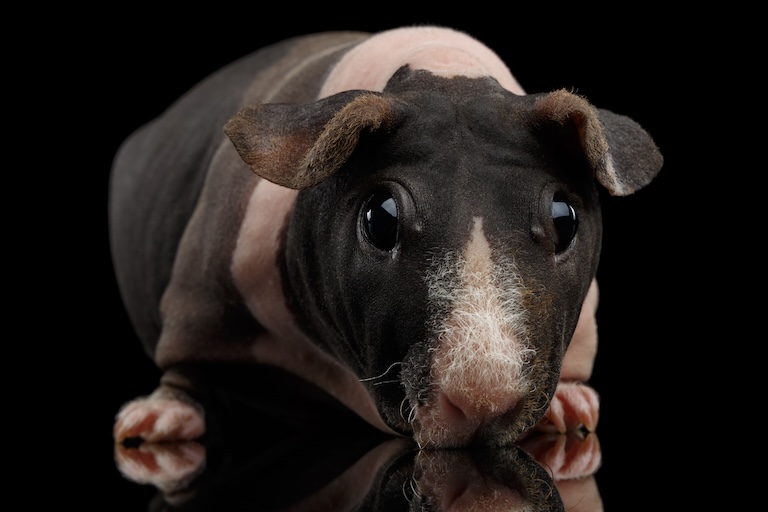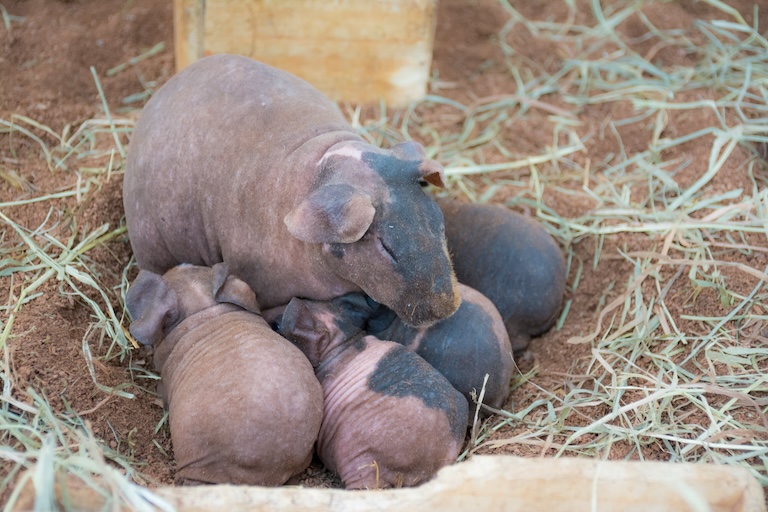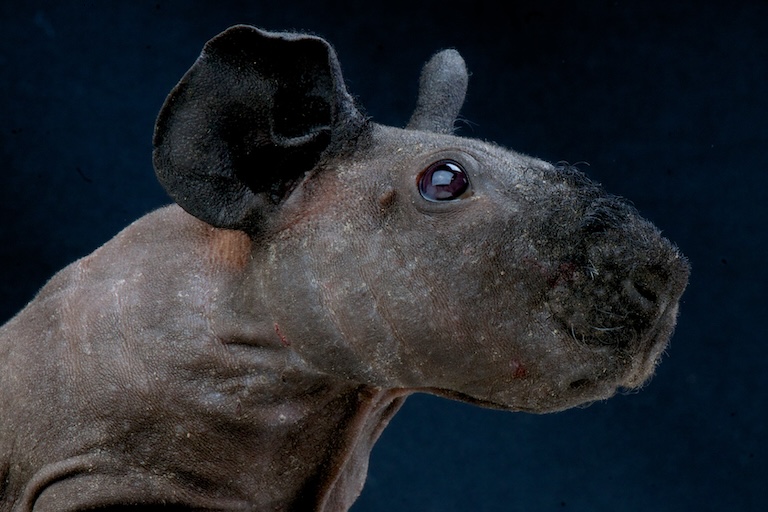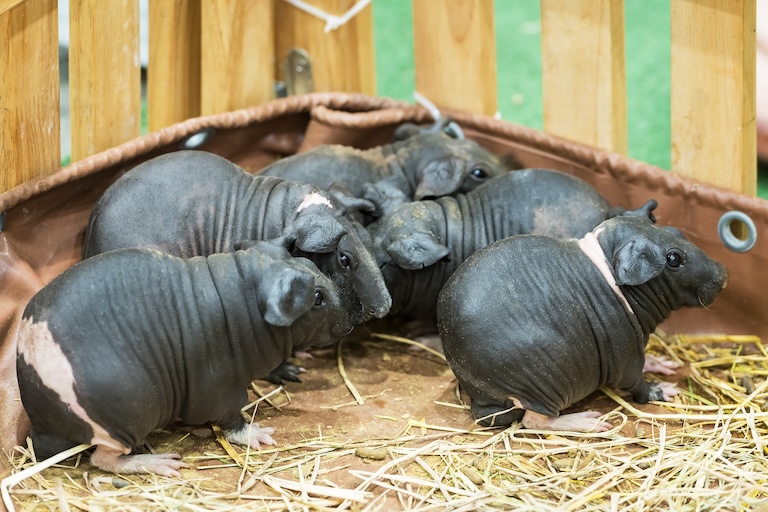Skinny Pig Profile
Human interference with the natural flow of genes between animals has created many an abomination over the centuries. A significant proportion of all ‘purebred’ dogs are unhealthy or unstable and most are predisposed to a lot more disorders and diseases than their mixed relatives.
The white tiger, a common attraction at “Zoos” is another good example of people putting their entertainment above the health of the animal, and even in the world of cavy fanciers, there is a subset of people who were so caught up in whether they could, that they forgot to ask whether they should.
Welcome to the skinny pig.

Skinny Pig Facts Overview
| Habitat: | Domestic, laboratory |
| Location: | Worldwide |
| Lifespan: | 5-7 years |
| Size: | 30cm (12 inches) long |
| Weight: | Up to 900g (2 lb) |
| Colour: | Varied, usually light to dark brown |
| Diet: | Herbivorous, veggies, fruits, roots |
| Predators: | None/pet cats |
| Top Speed: | Unknown |
| No. of Species: | 1 |
| Conservation Status: | Not Listed |
The Skinny Pig is a mutated guinea pig from the lab. This isn’t a conspiracy theory, it’s just bad science. They are mostly bald, with some having fur on their faces and hands.
As a result, they can’t handle the cold or the sun and need special attention. While it’s possible to care for one quite well with some advanced husbandry, there’s not a lot you can do about the inherent genetic weakness that comes from inbreeding animals for the pet trade.
As a result, their very existence is controversial and as always with pets, regulations are too slow, too weak and too poorly enforced to rely on for an ethical judgment.
They are super cute, but whether that’s enough reason to breed them is a matter of debate.
Interesting Skinny Pig Facts
1. They’re hybrids
The bald guinea pig gene was discovered in the lab, which is where a lot of guinea pigs sadly spend their days. It looks like it was a spontaneous mutation, and then was bred into lines of guinea pig for comedy effect, and for better availability as test subjects for cosmetics.
So, in terms of genetics, they’re just the ordinary pet guinea pig species, but one with a combination of recessive genes that result in an embarrassing case of alopecia.
2. They’re not much more than just a hairless guineapig
So, there’s nothing much that’s outstanding about them relative to other guinea pigs. They have the same character, social hierarchies, cute little grunts and whimperings; they’re just bald.
They do well with hairy varieties, just as much as their own kind, and as guineapigs are super sweet by nature, they aren’t as aggressive as some other balding animals can be.
One key difference is that they need to eat more than your run-of-the-mill draught excluder. The lack of hair means they lose heat more easily, requiring more calories to maintain their body heat. Their perfect ambient temperature is, as you’d expect, a little higher than the optimum for your basic ‘pig.1

3. They can get sunburned
For those of you lucky enough to have a fully-maned scalp, sunburn on your bald patch has probably never come up. Some of us, including skinny pigs, aren’t as fortunate.
These tressless little rodents did not evolve to be bald as an adaptation to their environment, so they don’t really get a lot of benefit out of it, and there have been no corresponding adaptations to protect them from the sun. As such, if they’re left outside too long, they turn to crackling.
4. They often have shorter whiskers
It’s not only their fur that’s lacking, their whiskers are often missing or significantly shortened. In animals with eyes very far apart, their blind spot is right in front of them, so when looking through the food cupboard, they can never find what you’ve asked them to get you.
In situations like this, a healthy, hairy guinea pig would use its tactile senses in the form of whiskers and vibrissae, but since the skinny pig is a bit of a circus freak and doesn’t have them, they’re at risk of bumping into stuff. They might also get more dust and grit in their eyes, on account of the reduced eyelashes.

5. They can be werewolves
Here’s a curious thing. Some skinny pigs are born with hair. You’d think this would just make them a bog standard cavie, but pet lovers are notoriously inconsistent, so there’s a name for it.
Hairy bald guinea pigs are known as werewolves. In their defence, these don’t look a lot like the regular guinea pigs, as the hair is often patchy and covers part of their faces so they do look a bit like they were halfway morphed when the full moon stopped.
Hormonal cycles mean that werewolves gain and lose hair on and off, especially during pregnancy.
6. They can be hippos
The inverse of a werewolf is a hippo, and this one is pretty apt. Especially young skinny pigs are remarkably baby-hippo-like and are affectionately named as such. 2

7. They can be unhealthy
With such a genetic bottleneck involved in their breeding, this mutant guinea pig is prone to genetic disorders. Further, their lack of fur makes them vulnerable to natural conditions, such as those you might find outside.
Their immune systems aren’t all that good either, and the debate is ongoing as to whether the entertaining novelty of a bald rodent justifies their continued existence.
Some countries are much better at animal protection than others – for example, in Switzerland, it’s illegal to only own one guinea pig (or cat) because they’re so social. Likewise, some places are catching on to the dubious ethics around inbreeding sentient beings for fun, and local laws have seen them taken out of pet stores in the US.
National laws elsewhere have some catching up to do, but there’s a chance that the breed will be disappearing from the mainstream in the future. 3 4 5
Skinny Pig Fact-File Summary
Scientific Classification
| Kingdom: | Animalia |
| Phylum: | Chordata |
| Class: | Mammalia |
| Order: | Rodentia |
| Family: | Caviidae |
| Genus: | Cavia |
| Species: | Porcellus |
Fact Sources & References
- “Do skinny pigs make good pets?”, animal club.
- The Koala (2022), “Skinny Pig and Guinea Pig Facts ! Princess Peach Costumes| The Koala”, YouTube.
- Paul Liotta (2023), “NYC Council bans sale of guinea pigs; here’s why”, New York City Council.
- (2012), “Skinny Pigs…Thoughts?”, Guinea Pig Cages.
- Katherine E. Quesenberry (2019), “Breeding and Reproduction of Guinea Pigs”, MSD Manual.
